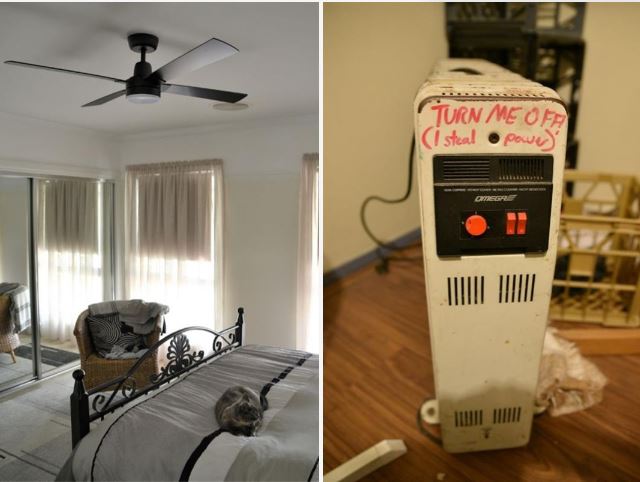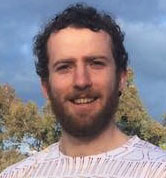Staff profile: Dr Rex Martin

Image 1: A participant’s cat who was described as having an expression as if to say “put the fan on” during hot weather, representative of social feedback.
Image 2: An example of materials providing feedback, whereby an energy-hungry heater in a student share house signals how it shouldn’t be overused.
14 June 2024
Imagine this, you are watching the evening news on TV, the stories of the day have finished and now it’s time for the weather report. Built into the weather report is an icon that suggests ways for householders to utilise their consumer energy resources for the following day. For example, a stretch of overcast, rainy weather is forecast and there are predicted lulls in rooftop solar generation. An icon pop ups on the screen suggesting people consider doing their housework ahead of the poor weather, or to use appliances like the washing machine during the middle of the day to make the best use of limited solar generation.
We are familiar with pollen counts, UV ratings and thunderstorm asthma which combine health information with the weather. This is a similar idea, but instead of health information it combines energy data as a means to support households to manage their energy.
Connecting an existing human interest (the weather) with the energy industry’s need to help people manage their energy demand is an area that our newest social scientist, Dr Rex Martin has been exploring. It’s part of a much broader body of work that Rex has been involved in, that is looking at how people use energy in their everyday lives.
Rex came to the world of energy and social science via two pivotal experiences. Firstly, while studying a Bachelor of Arts in European Studies, Rex spent some time living in an eco-suburb in Freiburg, Germany. It was here that he experienced a more sustainable way to live one’s life. Coming from car-centric Canberra, the opportunity to live in a city where almost everything was in walking distance inspired Rex to retrain in something with more of an environmental focus. On returning to Australia Rex enrolled in a Masters of Environment at ANU.
His interest in social science developed as part of his Master’s program where he spent some time on the Hebridean island, Eigg, off the Scottish mainland. An island which boasted the first primarily renewable microgrid in the world. It was here that Rex developed an appreciation for talking to householders and understanding other people’s perspectives. Returning to Australia Rex went on to complete a PhD at Monash University alongside some of Australia’s pre-eminent energy social scientists.
If there is one main thrust to Rex’s work as an energy social scientist, it is about refocussing attention away from the energy system and back onto householders.
“Let’s ask the question, “What do people need? Not what does the system need,” says Rex. “For example, energy tariffs foreground the priorities of the system. Of course, the system needs to function well but what social scientists are trying to do is invert the system to make it people centric. Some people aren’t able to rearrange their lives around tariffs. The family peak is between 5 – 7 pm. We wouldn’t penalise families for trying to feed and bathe small children at this time, and yet this is peak time for energy use, which means that often times it is the most expensive time of day to use energy in the home. This doesn’t support families,” said Rex.

The people-centric approach that Rex expounds demonstrates care for the many and varied people that make up our society. His approach also brings to the fore the importance of language.
“People are experts in their own lives,” says Rex. “That is the starting point when I go and speak with people about energy. You don’t go in and only ask about dry, boring stuff like tariffs, you ask about their home life, how they like to do things with their kids, for example.
“The language we use is important. Using the word “consumer” frames a person in an economic term, it diminishes them – they have complex emotions and complex lives that are valid and important outside of the economic sphere. The industry has traditionally flattened the complex lives of people into something that fits a model of the imagined way that they look at people.”
In a recently published paper, Rex and co-author Yolande Strengers argue that in order for the energy sector to both understand and better guide patterns of domestic energy use we need to decentre conventional energy feedback – which describes things like energy bills or apps that help us to quantify energy generation and consumption – and instead refocus attention on the non-energy data that informs everyday practices. They propose the concept of non-energy feedback as a means to understand the way that people use and think about energy in the home.
The four types of non-energy feedback explored in the article are sensory, social, material, and systemic, which refer to the “mundane data” and lay knowledge people use to guide their energy use. An example of social feedback is suggestions or demands from spouses and children to turn up heaters. An example of sensory feedback is using sight, touch and smell to determine whether we should wash or re-wear clothes. These are forms of data that clearly shape patterns of energy use, but which are not captured by the present focus on conventional energy feedback.
“The considerations that shape when and how people use energy are broader than the sector generally imagines. We genuinely need to understand people if we want to better include them and their consumer energy resources in the future energy system” said Rex.
